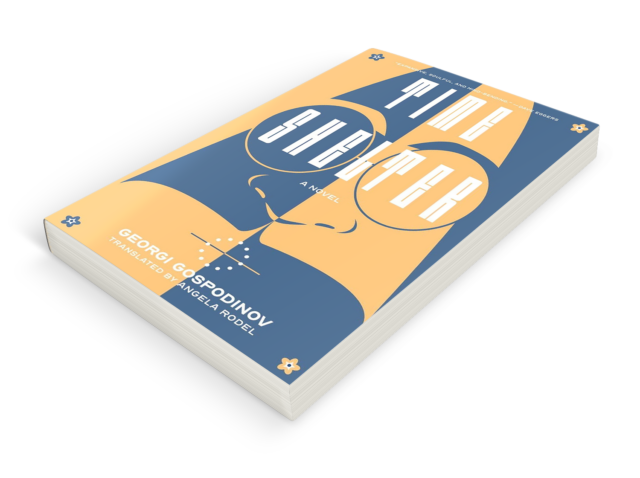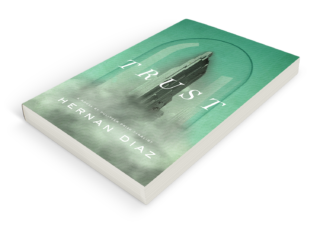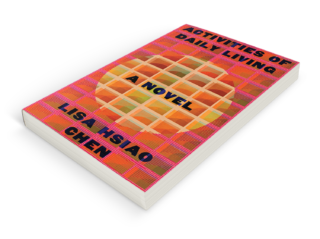Book Review Online
The Future Is Canceled
On Georgi Gospodinov’s novel, Time Shelter.
By Izidora Angel

Time Shelter
Georgi Gospodinov
Translated by Angela Rodel
Liveright, $27
“Now, there’s everything you need for a true beginning — bad dreams, war, and a headache.”
A chronicle of time itself: this is the ambitious task undertaken by Georgi Gospodinov, Bulgaria’s greatest living writer and annalist of an entire nation’s endless complaints and missed chances, in his Strega Prize–winning novel Time Shelter. Here, the past becomes both lived in and invented, a glorious utopia, the present is a muddied near-apocalyptic mess, and the future, well, the future’s canceled.
Translated into English by Angela Rodel, Time Shelter is a book of the world, much like its author, who now spends long periods of time writing outside his motherland but in his mother tongue, and it is also distinctly Bulgarian, born of a language possessing an inherent, porous melancholy. Finished in Berlin just as COVID was on the verge of sweeping through Europe, the novel is at times unnervingly prescient as it issues warnings against the perils of infection — physical, political, even metaphysical. Folding time onto itself and slipping between moods, narrators, decades, countries, and even languages, it also directs an unblinking gaze towards the numerous moral failings of communism, war, and poverty.
Gaustine, a recurring character in Gospodinov’s novels and the author’s alter-ego, is here an enigmatic, time-traveling geriatric psychiatrist. Together with the unnamed narrator (whom, as in all of Gospodinov’s books, we’re never quite dissuaded from assuming is the author himself), they open a “clinic for the past” in Switzerland. There, a new therapy for Alzheimer’s recreates the material and sensory reality of entire decades so that patients can exist among only their own happy recollections, scrubbed of the triggers of trauma. In one such room, for example, a nurse changes into soft slippers after the click-clacking of her heels floods a patient with the living horrors of her time in Auschwitz.
But the business model of this time shelter concept proves too enticing — soon the rooms captivate not just those whom disease has robbed of a future but their curious, healthy relatives too. The clinics begin spreading across Europe and soon entire countries wish to redraw the maps of their identities and return to their own individual, self-chosen “happy decades.” Even Switzerland, something of a “hidden island within Europe” suddenly wants to join in on the “Referendum on the Past.” Things take an even more sinister turn as, inevitably looking to capitalize on these trends, “dealers of the past” emerge, selling people their own distorted history back to them, while grand-scale reenactments of bloody battles and assassinations soon begin to eat away at the fabric of entire nations.
A student of the oral tradition of storytelling, as all Bulgarians are following five centuries of Ottoman subjugation and literary suffocation, Gospodinov is a perpetual collector of stories, and these are the brushstrokes that compose his abstract canvases. He blends the meta with the auto and the non in his fiction, and while his books are filled with memorable supporting characters, they often remain unnamed, their stories peripheral. Ultimately, Gospodinov himself is the alpha and the omega.
This creates a deconstructed, highly conceptual style full of intertwining vignettes, ruminations, and fragments all shooting back and forth in time, dialoguing with each other across novels. Time capsules, childhood memories, chujbina — that exotic, faraway land we all imagined on the other side of Bulgaria’s bucolic borders — all become through lines that zigzag through his work like flies. A poet at heart, Gospodinov can also write a novel in a single sentence: “The past is my home country.”
Both his 1999 debut, Natural Novel, translated into English by Zornitsa Hristova, and the masterful The Physics of Sorrow, written in 2011 and translated by Rodel, chronicled and examined the human condition, often through a particularly Bulgarian lens. This novel, his third, is more unequivocally political. In trademark style, Gospodinov still crafts the work as a literary mosaic, but in this instance it is underlaid with something far more traditional: a plot.
Despite Time Shelter’s speculative summonings of ill-begotten patriotism and biblical-style apocalypses, the novel, at its core, offers a sober reminder of what authoritarianism in Bulgaria actually felt like. The real stuff is just as shocking and sad as the invented. Bulgaria does indeed have the blood of its visionaries on its hands; in 1925, one of its most innovative poets and extraordinarily gifted translators (from five languages), Geo Milev, was put in a mass grave at thirty for writing an epic, rousing poem called “September.” And he is far from being the only one. Later in the same century, we also spent countless hours documenting what our neighbors and colleagues did so we could tell on them if we had to and we sure did. As recently as the nineties, we wiped our asses with squares of newspaper and stood in lines for bread and sugar. There were no tampons or international passports.
In Time Shelter, Gospodinov deftly folds these and other awful realities into his imaginings:
“In brief, his idea was to create a whole city set in a specific time… It’ll first be in 1985, let’s say. That’s where we’ll start… A year in the shadow of the following one, when we had Chernobyl, silence, radioactive rain, a deficit of iodine, which we secretly stocked up on…”
The Chernobyl disaster occurred on April 26, 1986, but it took the Bulgarian state-owned media three whole days to report it. As the radioactive cloud darkened over Europe and poured its poison rain on the fields and farms of Bulgaria, the message from the top remained: drink the milk, eat the lettuces and radishes, go on with your May Day manifestations (socialist-era parades), bury yourselves in the sandy beaches of the Black Sea. Meanwhile, the political elite drank bottled mineral water and munched on salads brought over from neighboring Greece.
Just three short years after Chernobyl, communism in Bulgaria fell in a bloodless revolution, which, predictably, presaged a cultural, political, and economic free fall. A seemingly chronic transition with no beginning or end engulfed Bulgaria like a radioactive cloud that brought only rain and rot. The future was a fog.
Decades passed before a meaningful cultural identity formed, together with the subcultures necessary to drive social progress and discourse. For too many who wished to do business or create art, the petty corruption, inveterate nepotism, and administrative indignities proved insurmountable. A vast cultural trade deficit formed with chujbina — that exotic foreign world outside our borders — as we hungrily consumed the West’s TV, books, music, and food, but exported very little of note. There was one major exception to this — Bulgaria became very good at exporting Bulgarians, with over a million leaving the country since 1989.
Because you can leave communism without it ever really leaving you, Gospodinov has a habit of veiling pain behind wistful humor, a defense mechanism no doubt born out of the system’s crushing eradication of revolt. He uses the absurdities of the very specific universe of Bulgarian pain, of Bulgarian provincial poverty, to unveil deep wounds. In coming across an advertisement taped to a pole in the town of Yambol (Gospodinov’s birthplace), in which a man looks to exchange his flatscreen TV for 30 liters of rakia, the narrator in Time Shelter remarks: “The rakia is gone, but the winter is still here. Now, there’s the whole existential novel of a people for you.”
When, in late 2021, I read the text in the original, my Bulgarian self felt awakened by Gospodinov’s unsweetened chronicling of our small country. But the playfulness was soon invaded by malice, congealing into a long prophetic doom scroll as it described the infection that is nationalism while being wholly unaware of that other imminent global contagion.
Time Shelter collapses the crises of the past and present without offering a future, as Bulgaria weighs whether to return to its pre-liberation past or socialism. A recollection of the narrator’s nightmarish childhood visit to the mausoleum of the communist leader Georgi Dimitrov (Bulgaria’s ode to Lenin’s mummification) precedes Dimitrov’s brief, macabre resuscitation during one of those same socialist manifestations. The scene then dissolves into a hallucinogenic nightmare as the crowd, clad in breeches, reenacts its doomed April Uprising of 1876. Meanwhile, three hundred drones surveil from above while flying a giant Bulgarian flag before releasing it and wrapping the city in a jingoistic pastiche of the artist Christo (a former Bulgarian himself).
The novel lurches forward as across Europe, each country begins its own referendum on the past. It’s an extended, ambitious, and often lush meandering but it weighs the material down, so overtly political and concerned with historical detail that it detracts from the author’s otherwise light touch on the page. In the absence of supporting characters to support the story, the second half of the novel becomes a patchwork of impossibly broad references: Shakespeare, Peer Gynt, the Old Testament, Russian hacking of elections, Borges, Tolstoy, García Márquez, Hemingway. Here again we see Gospodinov as the godhead of his own fictions, perhaps overplaying his authorial hand.
Hemingway once called the Bulgarian “that guttural tongue” in what is probably his only written comment on the subject. The Bulgarian language also has some of the sharpest elbows in Europe and translating its rich grammar comprised of nearly forty tenses and moods into the far softer and grammatically unremarkable English, is, for lack of a more ostentatious phrase, hard goddamn work. In Time Shelter, Angela Rodel, the most prolific and accomplished translator of Bulgarian literature into English, carries over Gospodinov’s grand, flowing Bulgarian sentences, with their maddening rivets and sometimes antiquated turns, into vivid English. Take обуща/obushta, for instance, which Rodel has rendered as old leather boots, not only capturing the meaning but also the music: if you say it three times quickly, it also sounds like obushta. Rodel displays admirable dexterity when she comes across something that doesn’t exist in English, such as станала/нестанала, by creating something new: happened/unhappened. Rodel is part of a grouping of extraordinary women translators working to preserve linguistic diversity that also includes Ekaterina Petrova and Velina Minkoff, as well as the writers Yordanka Beleva, Iana Boukova, and Joanna Elmy, who are today producing and exporting some of the most compelling and interesting contemporary literature from Bulgaria.
Time Shelter is rightly concerned with the perilous state of the world, with Bulgaria’s condition, specifically, and with that of any European country threatened by the titanic appetites of its neighbors. The urgent and unsubtle horror here is that the present is grayed out, that there’s more past than future.
Beneath the book’s speculative façade, it’s also clear the author is meditating on his own legacy as a man of words within it. Real, bloody conflict exists but something else is eating away at us too — a critical depletion of empathy, a critical mass of meaninglessness, as Gospodinov has called it, and it is the job of writers to counter these metaphysical but no less real dangers. Words are time shelters too — living, breathing portals to memory, experience, and history, archives and blueprints all at once.
Izidora Angel is a writer and literary translator in Chicago. She is the author of two translations from Bulgarian, Hristo Karastoyanov’s The Same Night Awaits Us All and Nataliya Deleva’s Four Minutes. Her work has been featured in Sublunary Editions, Electric Literature, Words Without Borders, and elsewhere. Izidora is at work on a memoir of essays about growing up under communism, the made and lost fortunes of a mercurial father, and escaping into anonymity in America. @izidora


